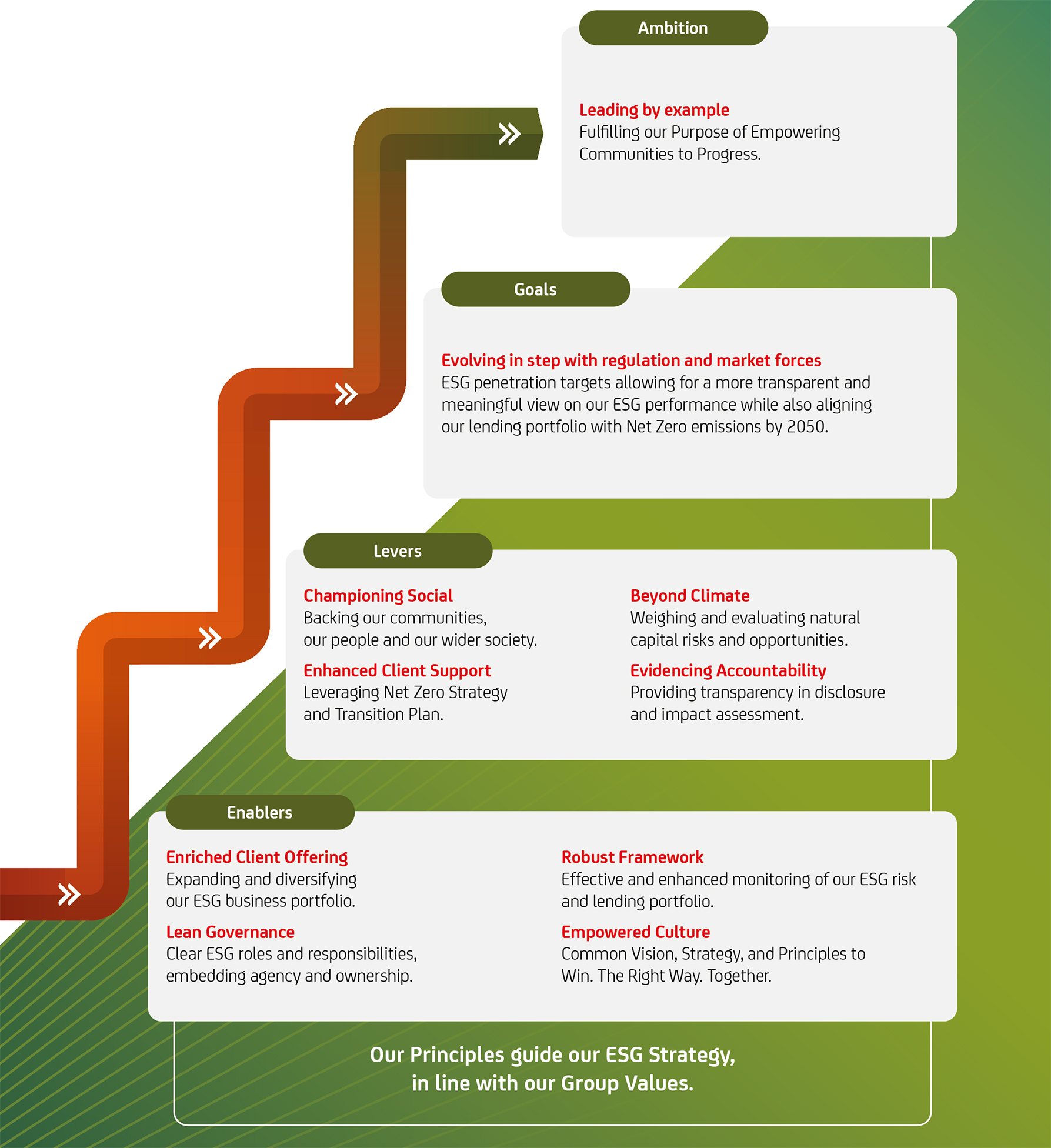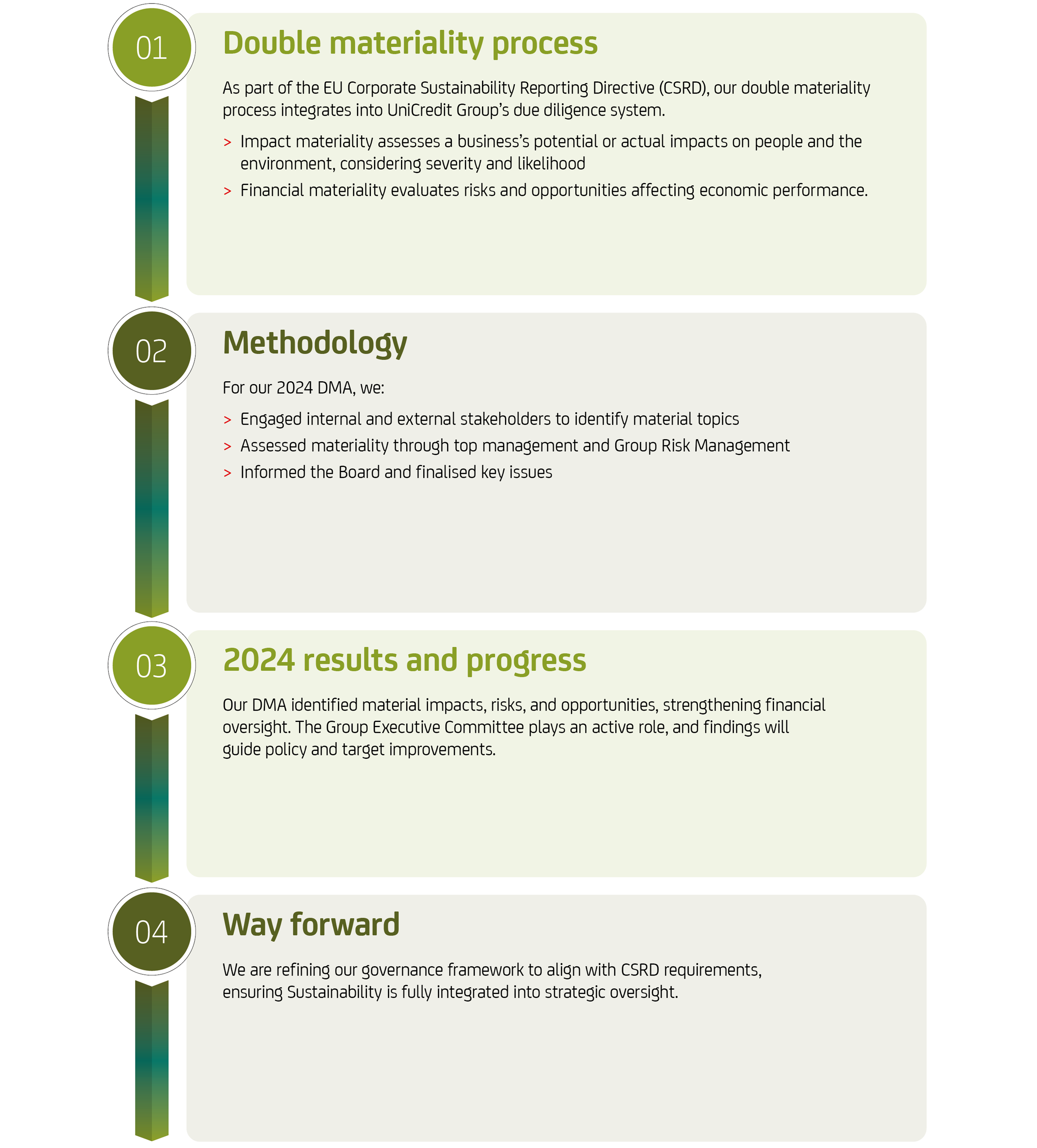UniCredit's evolving ESG Strategy supports our purpose of empowering communities to progress
We lead by example, which is why ESG (Environmental, Social and Governance) is at the heart of our strategic framework. Our purpose is guided by three principles:
- Holding ourselves to the highest possible standards to do the right thing by our clients and our communities
- Being fully committed to playing our part in supporting our clients in a just and fair transition
- Respecting and balancing the perspectives and priorities of all our stakeholders throughout our business and decision-making.
Over recent years we have built strong ESG foundations by:
1. Strengthening our ESG business proposition
Enhanced ESG business functions, enriched ESG client offerings and a supporting ESG ecosystem of strategic partners.
2. Advancing a distinctive social approach with tangible results
- Social Finance
- Direct social contribution
- Support to employees
3. Ensuring a just and fair transition through clear commitments
We are part of international initiatives, commitments and pledges including the United Nations Environment Programme Finance Initiative and the Finance for Biodiversity Pledge Foundation.
4. Guaranteeing accountability and transparency, along with a robust risk framework
- Maintaining a solid environmental, social and reputational risk management framework
- Providing disclosure on our ESG activities, through reports in line with sector guidelines and recommendations
5. Promoting ESG awareness across our organisation and beyond
Through our ESG Day, we bring our people and clients together to brainstorm key ESG-related issues, potential solutions, and develop concrete actions.
Evolving our ESG Strategy
Our strategy is based on strong fundamentals and a set of interrelated elements to deliver value. Guided by our principles, we implement key enablers required to support strategic levers, which in turn allow us to achieve the ESG goals underlying our ambition. This interconnected framework ensures alignment and cohesion across all ESG initiatives, maximising our impact.
In 2024 we updated our ESG penetration targets on total business volumes for 2025-2027 (to be achieved each year): 15% ESG lending, 15% Sustainable bonds, 50% ESG investment products.

Our Principles guide our ESG Strategy, in line with our Group Values.
Enablers
Enriched Client Offering
Expanding and diversifying our ESG business portfolio.
Lean Governance
Clear ESG roles and responsibilities, embedding agency and ownership.
Robust Framework
Effective and enhanced monitoring of our ESG risk and lending portfolio.
Empowered Culture
Common Vision, Strategy, and Principles to Win. The Right Way. Together.
Levels
Championing Social
Backing our communities, our people and our wider society.
Enhanced Client Support
Leveraging Net Zero Strategy and Transition Plan.
Beyond Climate
Weighing and evaluating natural capital risks and opportunities.
Evidencing Accountability
Providing transparency in disclosure and impact assessment.
Goals
Evolving in step with regulation and market forces
ESG penetration targets allowing for a more transparent and meaningful view on our ESG performance while also aligning our lending portfolio with Net Zero emissions by 2050.
Ambition
Leading by example
Fulfilling our Purpose of Empowering Communities to Progress.
Overview: Stakeholder Engagement
Listening to our stakeholders to strategically map and measure their interests, with regular investment in an effective engagement and feedback process, is fundamental to our bank's sustainability and business activities.
We strive to understand our stakeholders' expectations, as they contribute to much more than our financial success, and we are committed to providing our clients with support in the energy transition.
Every year, we conduct a materiality analysis to identify key stakeholder issues, including business impacts, risks, and opportunities (IROs) across ESG matters. In 2024, we performed our first Double Materiality Analysis (DMA), considering both impact and financial materiality to gain a comprehensive ESG perspective.

01. Double materiality process
As part of the EU Corporate Sustainability Reporting Directive (CSRD), our double materiality process integrates into UniCredit Group's due diligence system.
> Impact materiality assesses a business's potential or actual impacts on people and the environment, considering severity and likelihood
> Financial materiality evaluates risks and opportunities affecting economic performance.
02. Methodology
For our 2024 DMA, we:
> Engaged internal and external stakeholders to identify material topics
> Assessed materiality through top management and Group Risk Management
> Informed the Board and finalised key issues
03. 2024 results and progress
Our DMA identified material impacts, risks, and opportunities, strengthening financial oversight. The Group Executive Committee plays an active role, and findings will guide policy and target improvements.
04. Way forward
We are refining our governance framework to align with CSRD requirements, ensuring Sustainability is fully integrated into strategic oversight.
Contacts
Contacts, ESG and Sustainability
For further information or engagement, please contact:
Piazza Gae Aulenti, Torre A
20154 Milan (IT)
